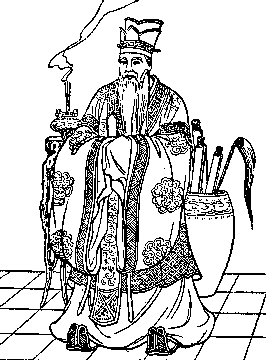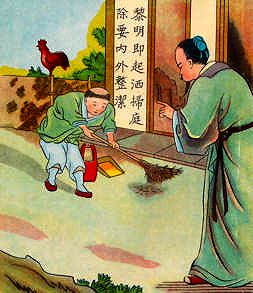
Content created: 1998-03-29
File last modified:


ZHŪ Bólú 朱柏卢 is the hào 号 or “friends’ name” given to Zhū Yòngdūn 朱用钝.
Zhū lived in the Kūnshān Xiàn 昆山县 district of Jiāngsū 江苏 Province from 1617 to 1688. His father, Zhū Jíhuáng 朱集璜, had been a rural scholar during the chaotic collapse of the late Míng 明 dynasty and led a group of vigilantes to defend the Kūnshān community against wandering bands of brigands.
Zhū Bólú had passed a Xiùcái 秀才 examination under the Míng régime and was well on his way to an official career, but the dynasty collapsed when he was in his 20s, and so he spent most of his life as a rural schoolteacher and geomancer. In that role, he gradually attained local fame for his learning and morality, and under the Qīng 清 dynasty Kāngxī 康熙 emperor (reign 21a, 1662-1722) he was invited to serve as a local official, but declined to do so, presumably out of loyalty to the fallen dynasty.
Zhū’s writings included several volumes of essays and commentaries on the Confucian classics. None came anywhere near attaining the fame of the stubbornly Confucian “Maxims for Managing the Home,” presented here.
"Zhū Bólú's Maxims for Managing the Home" 朱柏卢之治家格言 was prepared with the intent to spread morality like jam over the land, and Zhū came to be called "Master Zhū" (朱子). Hence the text is also popularly called "Master Zhū's Maxims for the Home." (朱子家顺).
Today it is one of the most commonly reprinted of the classical popular morality tracts. Copies are frequently distributed free in temples, but it is also typically included as an appendix to almanacs, or in small collections of morality literature.

It is hard to imagine that a family run on Zhū’s principles would be a particularly jolly place. Indeed most of his injunctions, from getting up early in the morning to avoiding luxuries or hiring only ugly servants, make him out to be a dampenglee of the first order. (The picture at right is a modern artist's illustration of the opening lines. Although the text seems to be addressed to the household head, it is not he who is doing the sweeping as the cock crows. He supervises.)
On the other hand Zhū also counsels honesty, generosity, and fair dealing, which goes to the heart of Confucian civic responsibility (although not exactly jolliness). Zhū’s maxims, taken together, constitute a surprisingly full representation of how traditional China held that an ideal family head and his family should behave. The lingering popularity of the work suggests that even in the XXIst century, the maxims continue to attract interest, not just as an historical document, but as the outline of a commendable way of life.
Go to Bilingual Version
Return to top.
| Zhū Bólú's Maxims for Managing the Home | |
| 1. At dawn get up immediately, sprinkle and sweep the hall & porch, so that inside and outside are tidy and clean. | |
| 2. Then go to bed at dusk, and personally close and lock the doors. | |
| 3. With each bowl of gruel or rice you should recall that its production is not easy. | |
| 4. With each half length of silk or hemp, always remember "to make a thing is very hard." | |
| 5. It is good to make preparations before it rains; don't wait for thirst before you dig a well. | |
| 6. Be frugal in your comforts for yourself; when a guest do not prolong your stay. | |
| 7. If utensils are of good quality and clean, then pottery is better than gold or jade. | |
| 8. Drink and food should be simple, and well-prepared garden vegetables are better than precious delicacies. | |
| 9. Do not build a gorgeous house. Do not scheme for choice lands. | |
| 10. The "three types of nuns and six kinds of old crones" are introducers of promiscuity and theft.* |
*-"Three types of nuns and six kinds of crones" (sān gū liù pó 三婆六姑 is a traditional Chinese expression referring collectively to extra-familial female trouble makers. They are traditionally enumerated as follows:
- Three Types of Nuns (sān gū 三姑)
- Buddhist nuns (ní 尼)
- Daoist nuns (dào 道)
- female fortune tellers (guà 卦)
- Six Kinds of Crones: (liù pó 六婆)
- brokeresses (yá 牙)
- match-makers (méi 媒)
- spirit mediums (shī 师)
- women who pray in exchange for money (qián 虔)
- herbalists (yào 药)
- midwives (wěn 稳)
Go to Bilingual Version
Return to top.
| 11. When the maids are beautiful and the concubines charming, this is not a blessing in the women's quarters. | |
| 12. For servants, don't employ handsome boys. | |
| 13. Wives and concubines must avoid beautiful clothing. | |
| 14. Although ancestors are remote, they may not be worshipped insincerely. | |
| 15. Although children and grandchildren be simpletons, they must read the Classics. | |
| 16. Personal habits must be simple; children must be taught by righteous methods. | |
| 17. Do not seek unexpected wealth; do not drink beyond your capacity. | |
| 18. Do not take advantage of a vendor as he carries his wares on a shoulder pole. | |
| 19. On meeting relatives and neighbors who are poor or in distress, show kindness and compassion. | |
| 20. A family founded in meanness will not long prevail. | |
| 21. When human relationships* are perverted destruction instantly follows. |
*- Human Relationships: The relationships in question are the usual "five relationships" (wǔlún 五伦), viz. prince-minister (jūn-chén 君臣), parent-child (lit: father-son) (fù-zǐ 父子), husband-wife (fū-fù 夫妇), older & younger siblings (lit: brothers) (xiōng-dì 兄弟), and friend-friend (péng-yǒu 朋友).
Go to Bilingual Version
Return to top.
| 22. Among brothers, uncles, and nephews, those with much should help those with little. | |
| 23. Between old and young, women and men, decorum should be strict and speech dignified. | |
| 24. Listening to a wife's talk and harming one's own kin: how can this make one a good husband?! | |
| 25. Valuing wealth but slighting parents is unbefitting a son. | |
| 26. In marrying off a daughter choose a good son-in-law; do not demand a heavy brideprice. | |
| 27. In wedding a wife [to your son], seek a virtuous girl; do not count a heavy dowry. | |
| 28. A person who fawns before the rich and noble is most contemptible. | |
| 29. One who is haughty before the poor is mean beyond measure. | |
| 30. A respectable family avoids lawsuits, for lawsuits in the end are evil. | |
| 31. In social intercourse, avoid excessive talking; excessive talking causes losses. | |
| 32. Do not rely on your position to oppress orphans and widows. | |
| 33. Do not so lust after fine food that you needlessly kill cattle and fowl. | |
| 34. Obstinacy and self-approval result in many regrets. |
Go to Bilingual Version
Return to top.
| 35. Among the lazy and self-indulgent, it is difficult for a family to succeed. | |
| 36. Associating with evil youths, one must eventually be implicated [in their evil]. | |
| 37. To be humble before the people who are older and more experienced will serve in time of trouble. | |
| 38. How is one to know words lightly heard are not other people's slander? One must be patient and think two or three times. | |
| 39. If you quarrel over something, how do you know it is the other who is wrong? One must rethink things with a calm heart. | |
| 40. Don't think about your own acts of benevolence; but never forget kindnesses received. | |
| 41. In all things allow spare ground. Having obtained the objective, don't go further. | |
| 42. When others celebrate happy occasions, do not be envious. | |
| 43. When others suffer misfortunes, do not rejoice. | |
| 44. Good done so people can see it is not a good deed. | |
| 45. Evil done that fears exposure is truly great evil. | |
| 46. To have a lustful heart on seeing a beautiful woman will bring retribution on one's wife and daughters. | |
| 47. To take secret revenge when one has a grudge will bring disaster upon sons and grandsons. | |
| 48. If a household is harmonious, then although breakfast and supper may be scanty, there will still be great happiness. | |
| 49. If taxes are paid early, then, although one's purse be light, one will feel great satisfaction. | |
| 50. In study one should aim at [the level of] the saints and worthies, not merely at a degree. [Students, take heed! —DKJ] | |
| 51. As an official one's heart should be with one's lord and country; how can one plan to advance oneself and one's family?! | |
| 52. Keep in your social position and accept your fate. Follow the times. Obey Heaven. | |
| 53. Lead your life in this way and you will approach [the sages]. |
Go to Bilingual Version
Return to top.